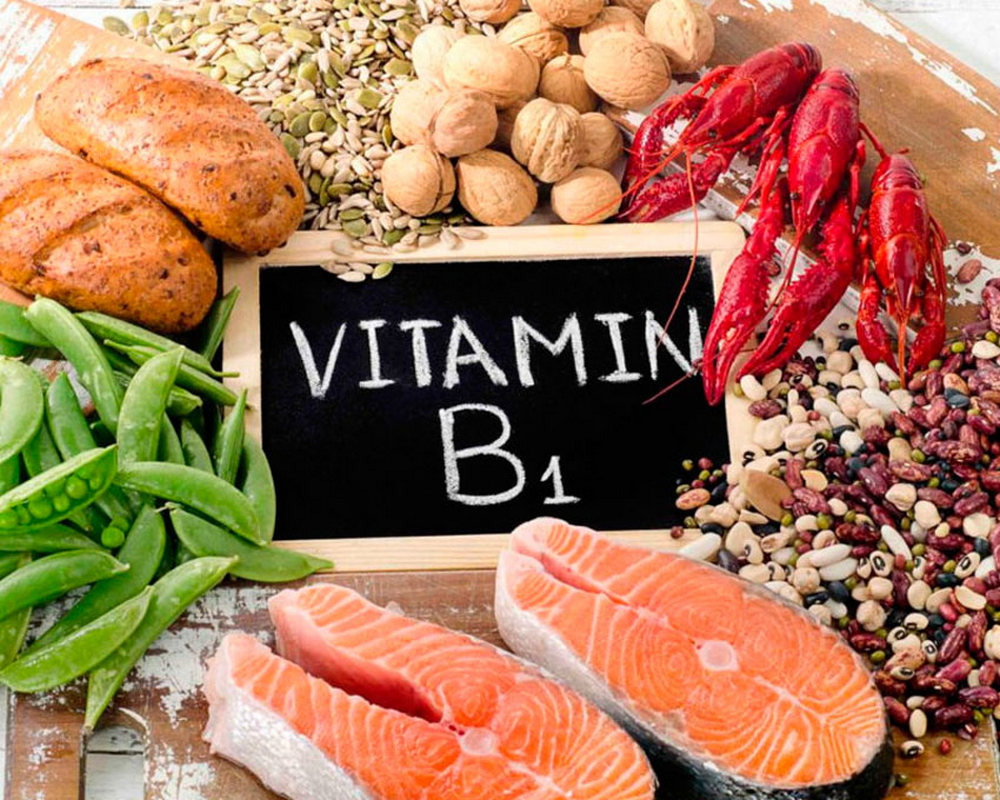Thiamine (Vitamin B1)
Thiamine, also known as vitamin B1, was the first water-soluble vitamin to be described scientifically.
Types:
Many forms of thiamine exist, including:
Thiamine pyrophosphate: Also known as thiamine diphosphate, thiamine pyrophosphate is the most abundant form of thiamine in your body. It is also the main form found in whole foods.
Thiamine triphosphate: This form is found in animal-sourced foods, but is less abundant than thiamine pyrophosphate. It is believed to represent less than 10% of the total thiamine found in animal tissues.
Thiamine mononitrate: A synthetic form of thiamine often added to animal feed or processed food.
Thiamine hydrochloride: The standard, synthetic form of thiamine used in supplements.
Role and Function:
• Like the other B vitamins, thiamine serves as a coenzyme in the body. This applies to all its active forms, but thiamine pyrophosphate is the most important one.
• Coenzymes are small compounds that help enzymes trigger chemical reactions that otherwise wouldn’t happen on their own.
• Thiamine is involved in many essential chemical reactions. For instance, it helps convert nutrients into energy and supports sugar formation.
Dietary Sources
• The richest dietary sources of thiamine include nuts, seeds, whole grains, liver and pork.
• Poor sources are fruits, vegetables and dairy products.
Recommended Intake
The table below shows the recommended daily allowance (RDA) for thiamine.
The RDA for infants hasn’t been established. Instead, the table shows the adequate intake.
RDA (mg/day)
Infants 0–6 months 0.2
7–12 months 0.3
Children 1–3 years 0.5
4–8 years 0.6
9–13 years 0.9
Women 14–18 years 1.0
19+ years 1.1
Men 14+ years 1.2
Pregnancy 1.4
Lactation 1.4
Deficiency
• Deficiency is uncommon, but high blood sugar levels may increase thiamine elimination via urine, raising its requirements and the risk of deficiency. In fact, thiamine levels may be reduced by 75–76% in people with type 1 and type 2 diabetes.
• People with alcoholism are also at an increased risk for deficiency because of a poor diet and impaired thiamine absorption.
• Serious deficiency may lead to disorders known as beriberi and Wernicke-Korsakoff syndrome.
• These disorders are associated with a range of symptoms, including anorexia, weight loss, impaired neural function, mental problems, muscle weakness and heart enlargement.
Side Effects and Toxicity
• Thiamine is considered safe. There are no reports of adverse effects after the intake of high amounts of thiamine from food or supplements.
• This is partly because excess thiamine is quickly excreted from the body in urine.
• As a result, the tolerable upper intake level for thiamine has not been established. However, this does not rule out possible symptoms of toxicity at very high intakes.
Benefits of Supplements
• No good evidence shows that thiamine supplements benefit healthy people who get adequate amounts from their diets.
• But for those with high blood sugar levels or a poor thiamine status, high-dose supplements may reduce blood sugar and blood pressure.
• Additionally, low thiamine intake has been associated with various other disorders, such as glaucoma, depression and fibromyalgia. However, more research is needed before strong conclusions can be made.
Summary of Thiamine
• Thiamine, also known as vitamin B1, was the first B vitamin to be discovered.
• Like the other B vitamins, thiamine acts as a coenzyme. It plays an essential role in many metabolic processes, including those that convert nutrients into energy.
• The richest dietary sources of thiamine include liver, pork, seeds and whole-grain cereals. Deficiency is uncommon, but diabetes and excessive alcohol intake increase the risk. Serious deficiency may result in diseases such as beriberi and Wernicke-Korsakoff syndrome.
• High-dose thiamine supplements do not seem to have any adverse effects and the tolerable upper intake level hasn’t been established. However, supplements do not appear to have any benefits for those who get adequate amounts from their diets.
THIAMINE

